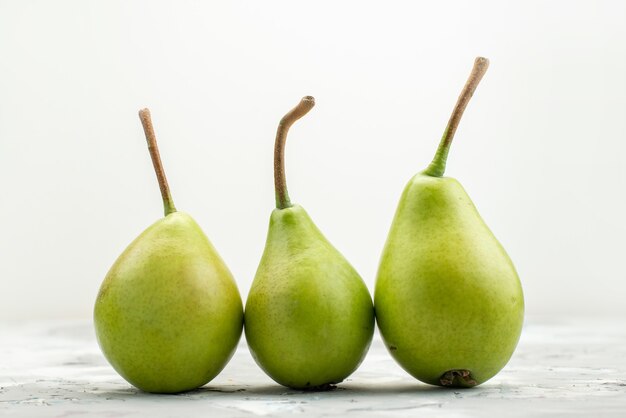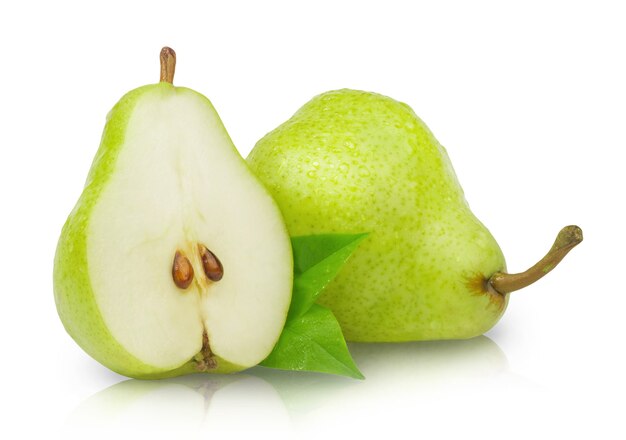Pears are among the most popular fruits in the U.S., appreciated for their sweet taste, juicy texture, and versatility. But beyond their delicious flavor, pears pack a powerful nutritional punch, making them a staple in healthy diets. Are pears healthy? Absolutely! In this article, we’ll dive deep into the nutritional profile and health benefits of pears to uncover why they deserve a spot in your daily routine.
Nutritional Profile of Pears
Pears are not just tasty; they are nutrient-dense. Let’s examine what makes them so nutritious.
Macronutrient Composition
A medium-sized pear (about 178 grams) offers a well-balanced mix of macronutrients. Here’s a breakdown:
- Calories: 101
- Carbohydrates: 27 grams
- Dietary Fiber: 6 grams (21% of the daily value)
- Protein: 1 gram
Pears are low in calories but rich in fiber, which supports digestion and keeps you full longer. The natural sugars in pears provide a quick energy boost, while their low protein content makes them a great companion to other protein-rich foods.
Vitamins and Minerals
Pears are a treasure trove of essential vitamins and minerals. Key nutrients include:
- Vitamin C: Boosts immunity and promotes skin health.
- Vitamin K: Supports bone health and proper blood clotting.
- Potassium: Regulates blood pressure and fluid balance.
These nutrients make pears an excellent choice for maintaining overall health.
Antioxidants and Phytochemicals
Pears contain powerful antioxidants like flavonoids and phenolic acids. These compounds help combat oxidative stress, which can damage cells and lead to chronic diseases. Antioxidants in pears also have anti-inflammatory properties, adding to their list of health benefits.
Health Benefits of Pears
Pears are more than just a nutritious snack. Their unique composition offers numerous health advantages.
Digestive Health
Dietary fiber is one of the standout features of pears, especially the insoluble fiber found in their skin. This fiber helps:
- Prevent constipation by adding bulk to stool.
- Promote gut health by supporting beneficial bacteria in the digestive tract.
Regular consumption of pears can keep your digestive system running smoothly.
Heart Health
Pears are heart-friendly fruits thanks to their fiber and antioxidants.
- Fiber helps reduce bad cholesterol (LDL) levels, lowering the risk of heart disease.
- Antioxidants protect against oxidative damage that can contribute to heart conditions.
Including pears in your diet may support cardiovascular health and reduce your overall risk of heart disease.
Blood Sugar Regulation
Pears have a low glycemic index (GI), making them ideal for managing blood sugar levels. Their high fiber content:
- Slows sugar absorption, preventing blood sugar spikes.
- Enhances insulin sensitivity, helping those with diabetes maintain stable glucose levels.
Eating a pear as a snack is a smart choice for those monitoring their blood sugar.
Weight Management
Trying to lose weight? Pears can help. Their high water and fiber content promote satiety, curbing hunger pangs. A medium-sized pear makes a satisfying snack that helps you avoid unhealthy cravings. Plus, their natural sweetness satisfies your sweet tooth without adding extra calories.
Anti-Inflammatory Properties
Pears contain antioxidants like quercetin, which have strong anti-inflammatory effects. Chronic inflammation is linked to conditions like arthritis, diabetes, and heart disease. Adding pears to your diet may help reduce inflammation and protect against these illnesses.
Related to Read: Roasted Stuffed Pears
Pears and Disease Prevention
Pears are more than a delicious treat—they are powerful allies in preventing chronic diseases. Let’s see how they work.

Diabetes Prevention
Research suggests that pears may lower the risk of type 2 diabetes. Their high fiber content and low glycemic index make them ideal for stabilizing blood sugar.
- Fiber slows glucose absorption, preventing sudden spikes.
- Pears contain plant compounds like anthocyanins, which improve insulin sensitivity.
Studies published in journals like the American Journal of Clinical Nutrition have linked higher consumption of fruits like pears to better blood sugar control and reduced diabetes risk.
Cancer Risk Reduction
Pears may help reduce the risk of certain cancers, thanks to their high levels of antioxidants and phytochemicals.
- Flavonoids and vitamin C neutralize harmful free radicals that can lead to cancer.
- Fiber binds toxins in the digestive system, reducing exposure to carcinogens.
Regular consumption of pears has been associated with lower incidences of colon and stomach cancers. The anti-inflammatory properties of quercetin in pears also play a role in suppressing tumor growth.
Different Types of Pears and Their Unique Benefits
With over 3,000 varieties worldwide, pears come in many forms, each offering unique flavors and benefits.
Common Varieties in the U.S.
The most popular types of pears in the U.S. include:
- Bartlett: Known for their juicy sweetness and perfect for canning.
- Bosc: Crisp and ideal for baking due to their firm texture.
- Anjou: Versatile with a mild, sweet flavor, great for eating raw.
Each type has its own culinary uses and distinct taste profile.
Nutritional Differences Among Varieties
While all pears share similar nutritional benefits, subtle differences exist:
- Bartlett pears: Slightly higher in vitamin C.
- Bosc pears: Higher fiber content, making them excellent for digestion.
- Red Anjou: Rich in anthocyanins, beneficial for heart health.
These differences allow you to choose the variety that best suits your health goals and recipes.
Incorporating Pears into Your Diet
Adding pears to your diet is simple and enjoyable. Here’s how to get the most out of them.
Selecting and Storing Pears
- Choosing ripe pears: Look for fruits that are firm but yield slightly when pressed near the stem.
- Storage tips: Ripen pears at room temperature and store them in the fridge once they’re soft to the touch.
- Prevent browning: Use lemon juice on sliced pears to maintain their color.
Proper selection and storage ensure you enjoy the full flavor and nutritional benefits of pears.
Delicious and Healthy Pear Recipes
Pears can be used in a variety of dishes. Here are some ideas:
- Salads: Add sliced pears to a spinach and walnut salad for a sweet crunch.
- Desserts: Poach pears in red wine with cinnamon for an elegant dessert.
- Snacks: Pair fresh pear slices with almond butter or cheese for a satisfying snack.
Their versatility makes them a valuable addition to any meal plan.
Related to Read: Homemade Pear Sauce Canning Recipe
Potential Risks and Considerations
While pears are generally safe and healthy, there are a few things to keep in mind.

Allergies and Sensitivities
Some people may experience allergies to pears, particularly those with pollen-food syndrome. Symptoms may include:
- Itching or swelling in the mouth.
- Mild gastrointestinal discomfort.
If you have sensitivities, consider cooked pears as heat often reduces allergens.
Pesticide Exposure
Pears are sometimes treated with pesticides, so:
- Wash thoroughly: Use water and a produce brush to remove residues.
- Choose organic: This option minimizes exposure to harmful chemicals.
Taking these precautions ensures a safer consumption experience.
Conclusion
Pears are a nutritional powerhouse packed with vitamins, minerals, fiber, and antioxidants. From improving digestion to reducing the risk of chronic diseases like diabetes and cancer, their health benefits are undeniable. Whether you prefer them fresh, baked, or blended into smoothies, incorporating pears into your diet is a delicious way to support your overall health.
So, the next time you’re at the grocery store, grab a few pears and enjoy the sweet taste of health and wellness!
Related to Read: Delicious Canned Pear Recipe to Savor Year-Round
FAQs
1. Are pears good for weight loss?
Yes! Pears are low in calories and high in fiber, helping you feel full and satisfied, which can aid in weight management.
2. Can diabetics eat pears?
Absolutely. With their low glycemic index and high fiber content, pears are an excellent fruit choice for diabetics.
3. What is the best time to eat pears?
Pears can be enjoyed at any time of the day, but they make a great mid-morning or afternoon snack.
4. How many pears should I eat daily?
One medium-sized pear per day is enough to reap its health benefits while maintaining a balanced diet.
5. Are pear skins safe to eat?
Yes, pear skins are rich in fiber and antioxidants. Just ensure they are thoroughly washed before eating.

